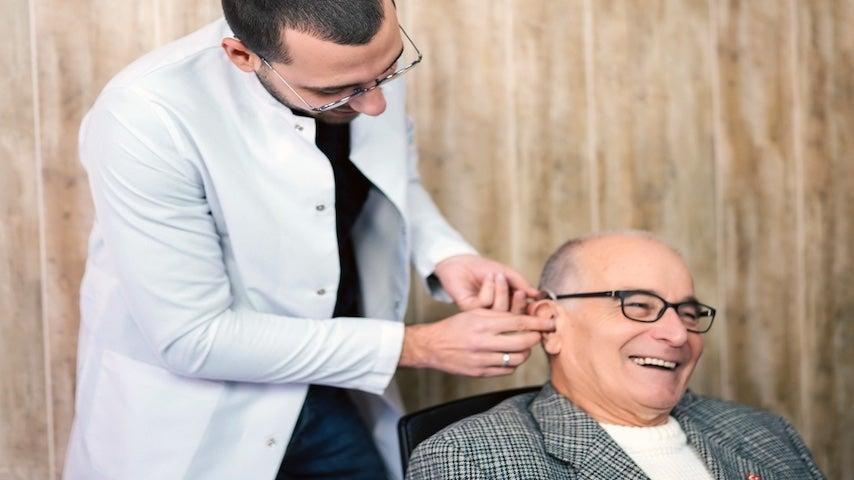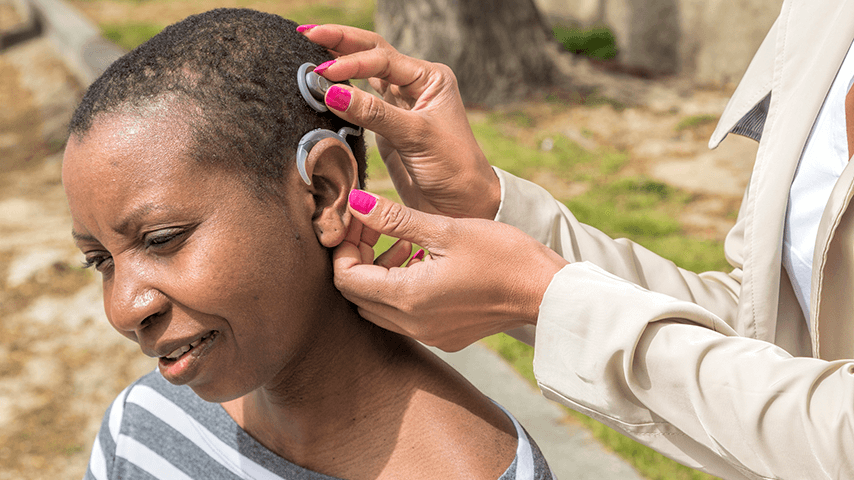
Related Topics
Not all hearing loss is the same. It can vary from person to person based on the type of hearing loss as well as the degree. A “type” of hearing loss refers to what part of your hearing is damaged. A “degree” of hearing loss refers to the severity of the damage.
Knowing your type and degree of hearing loss is one of the first steps to addressing it.
“Understanding the type and extent of your hearing loss allows you to explore the most effective treatment options,” said Stephanie Jaffe, AuD, a doctor of audiology at HearUSA in Augusta, Georgia. “Because hearing loss can be so diverse, and can affect people differently, it’s important to have your hearing evaluated to determine the cause and develop the most appropriate treatment plan.”
This article will explain the most common types of hearing loss and the different degrees of hearing loss. We hope to empower you to make more informed decisions about your hearing health.
Sensorineural hearing loss
Sensorineural hearing loss is the most common type of hearing loss, according to the American Speech-Language-Hearing Association (ASHA).1 It happens when there is damage to the inner ear or hearing nerve (that connects to the brain). Sensorineural hearing loss can be caused by aging, illness, exposure to loud noises, head injury, certain drugs, or an inherited condition.
Noise-induced hearing loss is considered sensorineural. For example, people who frequently attend rowdy sporting events or work regularly with loud power tools may be at risk of noise-induced hearing loss.
Age-related hearing loss, also called presbycusis, is the hearing loss we experience slowly over time.
Sudden sensorineural hearing loss (also called rapid sensorineural hearing loss) is when you experience a loss of hearing instantly or quickly over a few days. You must speak to a doctor within days if this happens—the longer you wait, the less likely it is to be treated successfully.
Treatment for sensorineural hearing loss depends on the cause—usually, medicine or surgery cannot fix sensorineural hearing loss. But hearing aids may help.
Conductive hearing loss
Conductive hearing loss is when it’s hard for sounds to get through to your inner ear due to infections, blockages, and structural issues with your ear.2 With conductive hearing loss, louder sounds can be muffled, and it can be hard to hear softer sounds.
Conductive hearing loss can be caused by fluid in your middle ear from a cold or allergy, ear infections, earwax stuck in your ear canal, a hole in your eardrum, an object in your ear, or problems with how your outer or middle ear is formed.
Unlike sensorineural hearing loss, conductive hearing loss is usually treated with medicine or surgery. But conductive hearing loss can also be treated with traditional or bone-anchored hearing aids, which transmit sound to your brain via the bones in your skull, bypassing the issue in your inner ear.3
Bone-anchored hearing aids come in two types. Surgically implantable (the more common type) require a surgeon to place a small titanium implant in the bone behind your ear. Nonsurgical are usually for children younger than 5.
Mixed Hearing Loss
Mixed hearing loss is a combination of the two—anything that causes sensorineural or conductive hearing loss can cause mixed hearing loss.4
For example, you could have sensorineural hearing loss due to aging and conductive hearing loss due to ear wax blocking your inner ear.
Treatments for mixed hearing loss depend on the cause but could include any options under conductive or sensorineural.
Degrees of hearing loss
There are five main degrees of hearing loss,5 which refer to how severe the hearing loss is and how loud sounds need to be for you to hear them (in decibels, or dB, which measure sound):
- Mild (26–40 dB): Someone with mild hearing loss may hear some sounds, but softer speech will likely be difficult to hear. The sound of a whisper or quiet library is 30 dB.6
- Moderate (41–55 dB): Someone with moderate hearing loss may hear almost nothing when a person is speaking at a normal volume. The sound of moderate rainfall is 50 dB.
- Moderately severe (56–70 dB): Someone with moderately severe hearing loss will hear no speech when a person speaks at a normal volume but will still hear loud sounds. The sound of a running dishwasher or clothes dryer is 60 dB.
- Severe (71–90 dB): Someone with severe hearing loss will hear no speech when a person speaks at a normal volume and only hears some loud sounds. The sound of an alarm clock is 70 dB.
- Profound (90 dB or higher): Someone with profound hearing loss won’t hear any loud speech and only very loud sounds. The sound of a food processor is 94 dB.
OTC hearing aids can treat mild to moderate hearing loss. To address any other degrees of hearing loss, you’ll need prescription hearing aids.
Hearing tests
If you’ve never had a hearing test before, experts recommend you get an in-person test with a hearing professional before purchasing OTC hearing aids. That’s because an in-person test with a professional may uncover hearing issues that hearing aids can’t address, such as impacted ear wax.
“If you’ve never had a hearing assessment by an audiologist and decide to go directly to OTC hearing aids, you may be doing yourself a disservice,” said Viral Tejani, AuD, a doctor of audiology at University Hospitals in Cleveland.
A comprehensive hearing test by an audiologist will evaluate various aspects of your hearing and make sure that there are no other issues (for example, hearing tumors, ruptured ear drums, or ear infections).
"If there are no other issues, then you may start considering the OTC route (understanding that follow-up care is limited compared to prescription hearing aids),” Tejani said.
To get a hearing test, contact a local hearing clinic covered by your insurance. Medicare covers hearing exams when medically necessary. Medicare won’t cover hearing exams solely for the purpose of getting hearing aids. Medicare Part B may cover hearing and balance exams if your health care provider orders them to see if you need treatment for a condition other than hearing loss, such as vertigo.
After the test, the hearing professional will share your audiogram (results of your hearing test) with you.7 Based on your results, the specialist will explain your treatment options, which could be hearing aids or a procedure like one to remove blocked earwax. If you need hearing aids, the specialist will recommend devices that treat your type and degree of hearing loss.
Although the ASHA says8 there’s no standard hearing screening schedule for adults, Johns Hopkins Medicine recommends getting your hearing checked every year as an adult during your annual physical.9
Frequently Asked Questions
What kind of hearing loss cannot be treated?
Sensorineural hearing loss typically can’t be treated with medication or surgery, but hearing aids can help, depending on the severity and cause of your hearing loss.
What level of hearing loss requires a hearing aid?
People with moderate-to-severe hearing loss require hearing aids, but people with mild hearing loss can also benefit from aids. You’ll want to talk to your doctor about the best plan for you.
Sources
1. American Speech-Language-Hearing Association. Sensorineural Hearing Loss. Found on the internet at https://www.asha.org/public/hearing/sensorineural-hearing-loss/
2. American Speech-Language-Hearing Association. Conductive Hearing Loss. Found on the internet at https://www.asha.org/public/hearing/conductive-hearing-loss/
3. Cleveland Clinic. Bone-Anchored Hearing Aid. Nov. 21, 2023. Found on the internet at https://my.clevelandclinic.org/health/treatments/14794-bone-anchored-auditory-implant
4. American Speech-Language-Hearing Association. Mixed Hearing Loss. Found on the internet at https://www.asha.org/public/hearing/mixed-hearing-loss
5. Centers for Disease Control and Prevention. Types of Hearing Loss. May 15, 2024. Found on the internet at https://www.cdc.gov/hearing-loss-children/about/types-of-hearing-loss.html
6. American Speech-Language-Hearing Association. Loud Noise Dangers. Found on the internet at https://www.asha.org/public/hearing/loud-noise-dangers/
7. Cleveland Clinic. Hearing Test (Audiometry). May 22, 2024. Found on the internet at https://my.clevelandclinic.org/health/diagnostics/24104-hearing-test
8. American Speech-Language-Hearing Association. Adult Hearing Screening. Found on the internet at https://www.asha.org/practice-portal/professional-issues/adult-hearing-screening
9. Johns Hopkins Medicine. Baseline Hearing Test. Found on the internet at https://www.hopkinsmedicine.org/health/conditions-and-diseases/hearing-loss/baseline-hearing-test




